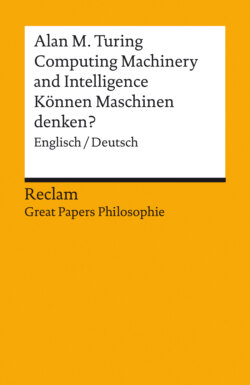Читать книгу Computing Machinery and Intelligence / Können Maschinen denken? (Englisch/Deutsch) - Alan M. Turing - Страница 6
На сайте Литреса книга снята с продажи.
[10]2. Critique of the New Problem.
ОглавлениеAs well as asking, ‘What is the answer to this new form of the question’, one may ask, ‘Is this new question a worthy one to investigate?’ This latter question we investigate without further ado, thereby cutting short an infinite regress.
The new problem has the advantage of drawing a fairly sharp line between the physical and the intellectual capacities of a man. No engineer or chemist claims to be able to produce a material which is indistinguishable from the human skin. It is possible that at some time this might be done, but even supposing this invention available we should feel there was little point in trying to make a ‘thinking machine’ more human by dressing it up in such artificial flesh. The form in which we have set the problem reflects this fact in the condition which prevents the interrogator from seeing or touching the other competitors, or hearing their voices. Some other advantages of the proposed criterion may be shown up by specimen questions and answers. Thus:
Q: Please write me a sonnet on the subject of the Forth Bridge.
A: Count me out on this one. I never could write poetry.
Q: Add 34 957 to 70 764.
A: (Pause about 30 seconds and then give as answer) 105 621.
Q: Do you play chess?
[12]A: Yes. [435]
Q: I have K at my K1, and no other pieces. You have only K at K6 and R at R1. It is your move. What do you play?
A: (After a pause of 15 seconds) R-R8 mate.
The question and answer method seems to be suitable for introducing almost any one of the fields of human endeavour that we wish to include. We do not wish to penalise the machine for its inability to shine in beauty competitions, nor to penalise a man for losing in a race against an aeroplane. The conditions of our game make these disabilities irrelevant. The ‘witnesses’ can brag, if they consider it advisable, as much as they please about their charms, strength or heroism, but the interrogator cannot demand practical demonstrations.
The game may perhaps be criticised on the ground that the odds are weighted too heavily against the machine. If the man were to try and pretend to be the machine he would clearly make a very poor showing. He would be given away at once by slowness and inaccuracy in arithmetic. May not machines carry out something which ought to be described as thinking but which is very different from what a man does? This objection is a very strong one, but at least we can say that if, nevertheless, a machine can be constructed to play the imitation game satisfactorily, we need not be troubled by this objection.
It might be urged that when playing the ‘imitation game’ the best strategy for the machine may possibly be [14]something other than imitation of the behaviour of a man. This may be, but I think it is unlikely that there is any great effect of this kind. In any case there is no intention to investigate here the theory of the game, and it will be assumed that the best strategy is to try to provide answers that would naturally be given by a man.
